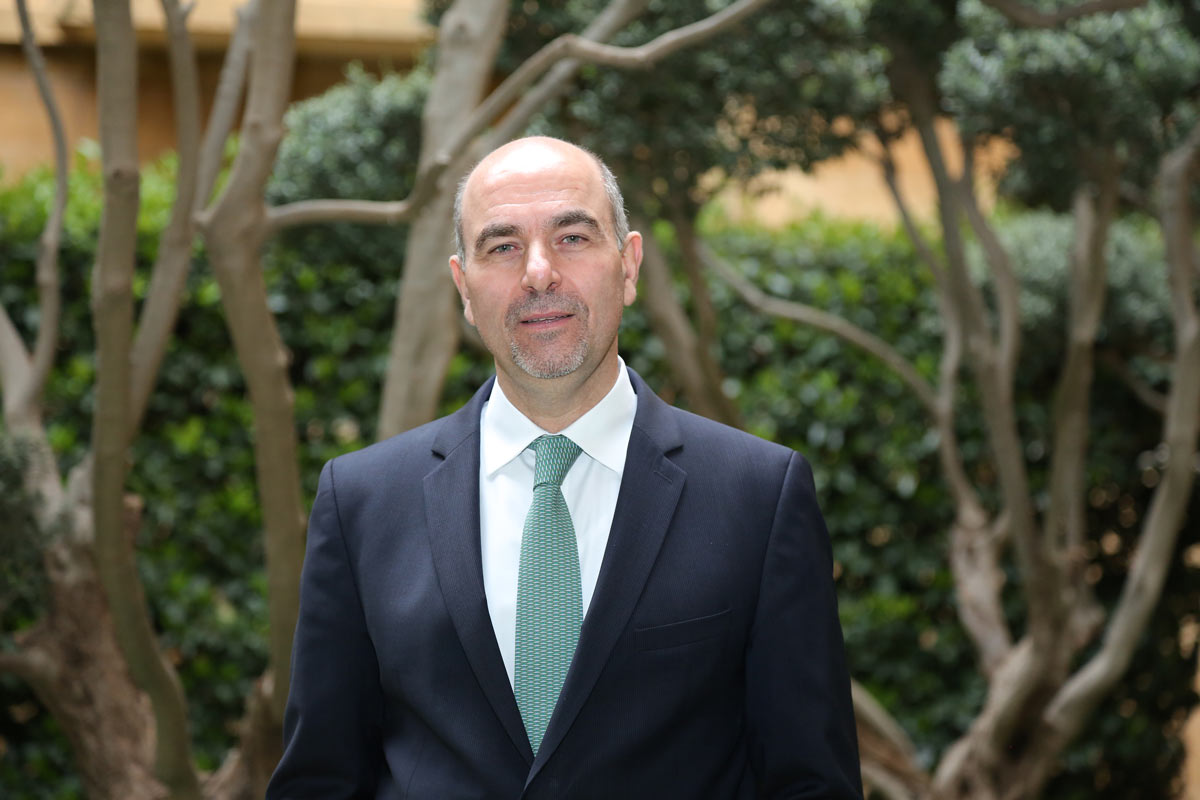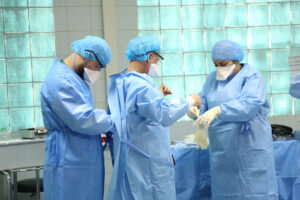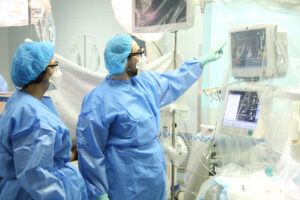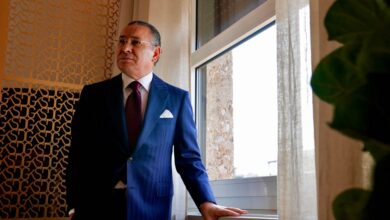Mr. Sami Rizk


The CEO of the LAU Medical Center-Rizk Hospital
Mr. Sami Rizk
“We have become today a hospital specialized to receiving corona patients from A to Z”
Upon arriving at the LAU Medical Center-Rizk Hospital’s entrance, you quickly become aware of the new strict procedures that the center applies in order to fight the novel coronavirus and limit its spread. The guard at the door wears a mask and only allows in those who have imperative needs. He then asks some routine questions such as: “Do you have fever or a sore throat? Did you meet someone who came from an affected country?”
After verifying the answers, you should remove the gloves you’re wearing, sterilize your hands, and then enter, provided that the guard leads you to your destination. We were heading to the office of the CEO, Mr. Sami Rizk, who informed us about the new policies pursued by the medical center with the objective of receiving confirmed or suspected cases of coronavirus. We discussed at great length the humanitarian initiative launched by the hospital since the beginning of the pandemic, the “mobile clinic”.
We will start talking about “Act of Compassion,” the initiative launched before the outbreak of the novel coronavirus. How has it been put into effect today to reduce this pandemic?
The Act of Compassion initiative started as a mutual idea between the LAU School of Medicine, represented by the Dean Dr. Michel Mouawad, and physicians at the hospital, after we have perceived the great need of many patients who are unable to provide the minimum level of hospitalization. At that time, the idea was to collect in a “piggy bank” a share of the physicians’ remuneration, in addition to providing a considerable number of free medications for patients who were to be received on Saturdays.
However, as soon as this initiative was launched, the coronavirus appeared in Lebanon and the whole country was busy fighting it. The whole medical body started working on confronting this virus at a time when we had finished setting up the mobile clinic that is roaming regions today and conducting free-of-charge PCR tests in various Lebanese towns.
Thus, we were able to put into effect the principle of “Act of Compassion” through a fully trained and equipped medical team that is roaming the regions and taking random samples for PCR testing.

We move on now to the procedures followed within the campus of the LAU Medical Center-Rizk Hospital.
Our first step was to create a task force with over 26 members including directors, administrators, the Dean of the School of Medicine, the Chief Medical Officer, heads of medical units, the nursing unit, the unit of infection control and bacterial diseases, and others. We used to meet daily via WebEx at 5 o’clock to keep up with the updates and gather opinions.
These meetings were the first building block of the steps followed today at the medical center where we were noting and discussing ideas to come up with new policies and procedures that were developed by specialists in infection control and bacterial diseases, primarily Dr. Jacques Mokhbat and Dr. Roula Hosni Samaha.
We came up with an integrated preparedness plan and began implementing it at the medical center with daily follow-up to make observations, noting that the precautionary policies followed today are in accordance with the recommendations of the World Health Organization and the CDC.
We did not stop here. We followed up on daily work by disseminating internal recommendations (Policies and Procedures & Internal Memos) to remind workers of their daily duties regarding the necessity of applying safety standards and procedures. We also intensively conducted training workshops via social media for all health care providers. Some of the workshops were conducted directly in our lecture hall but with less capacity in compliance with the rules of social distancing.
There are many standards and policies that we follow today at the medical center such as social distancing and reducing the number of daily employees. We also created a team of doctors and nurses whose job is only to contact workers and health care providers and ask them about the mechanism of work, whether they are feeling a symptom, or if they are facing any obstacles.
Doctors, nurses, guards, cleaning staff, and everyone working at the medical center are applying these standards today.
One of the most important things we came to at the beginning of this crisis is the impossibility of continuing to work at the hospital normally while receiving suspected or confirmed cases of coronavirus due to the seriousness of this issue and for fear of the possibility of contamination as a result of a mistake, even though it was accidentally made. We decided to close most of the nonemergency units and postpone the nonurgent operations which we call cold cases. We also closed the outpatient clinics, the one-day surgery unit, the endoscopy unit, the prior medical consultations unit, and others. We kept working only in the units of emergency, dialysis, oncology, and the novel coronavirus.
All these procedures have enabled us to become a hospital specialized to receiving cases of coronavirus from A to Z.

What other arrangements are directly related to the novel coronavirus?
The first thing we did was dedicating two rooms in the emergency unit to receive cases. They are not inside of the unit but rather a subordinate branch of it. We preferred that the two rooms be in the open air so that the patient does not enter the emergency unit and infect other patients.
In the emergency unit, we also created another section in the open air to conduct PCR tests so that the patient does not enter the medical center or the laboratory unit.
We have also dedicated two operating rooms for confirmed or suspected coronavirus cases. For example, if a woman in labor comes and is suspected of being infected, we cannot get her into a regular operating room.
We have three floors with a capacity of 43 beds fully equipped for cases of coronavirus and with an internationally accredited ventilation system, one floor for intensive care, and two floors for cases that need isolation. We also have around 22 ventilators for critical conditions.
Our laboratory is one of the laboratories licensed by the Ministry of Health on March 16 to perform PCR tests.
The testing is carried out in the negative pressure room which is a specialized room next to the emergency unit, meaning that it is outside of the medical center.
The tests are done based on a prior appointment made after that the patient has sent his identity via WhatsApp. Upon his arrival, he does not touch anything. He answers some routine questions and we ask him to bring the exact required financial value (i.e. 150,000 LBP – official tariff) which we take and put in a nylon bag. We take then the sample from the patient and he goes back home. We call him when the results are ready. We have also conducted many tests for our medical team at the center to check on them because they are the first line of defense. To date, we have conducted over 3,500 tests, whether in the mobile clinic or at the medical center. Only 3 to 4% of these tests were positive.
How would you evaluate your readiness today to support the Ministry of Health in fighting coronavirus?
In this context, it is necessary to salute the medical team working at Rafik Hariri University Hospital and their tremendous efforts in fighting the virus. They were in the first line of defense in this war.
Today, we support the Ministry in this battle. We have worked in the past two months on providing everything necessary to be fully prepared and boost our readiness if the number of cases increases, in order to be by their side in receiving patients and conducting tests.
We also worked on providing the necessary PPEs for nurses to enter the room of coronavirus patients despite their high cost. However, our medical and humanitarian duty makes it imperative that we work to the fullest, especially now that we have become a medical center equipped to receive corona cases from A to Z.
In this context, we hope to receive any assistance from the Ministry of Health in the event that it receives external support, at least in relation to the PPEs so that it will serve as support for us, private university hospitals that have assumed this humanitarian duty.














